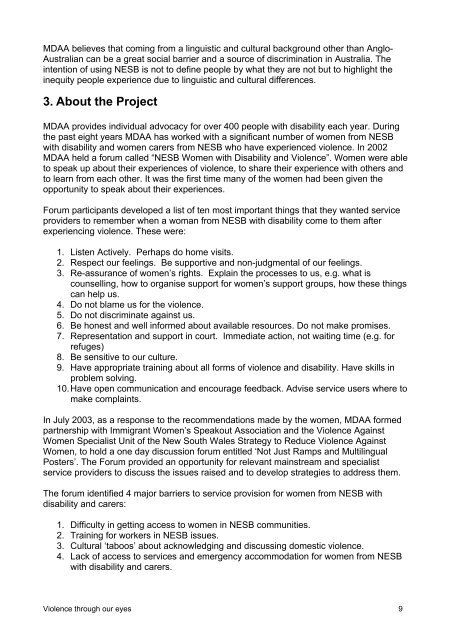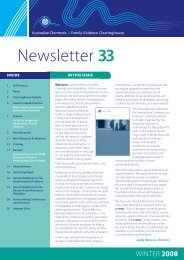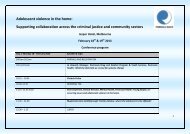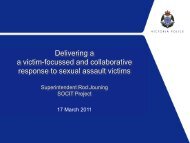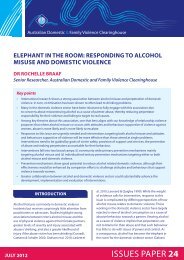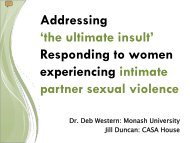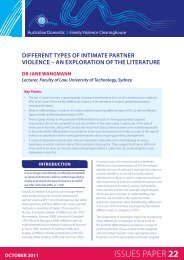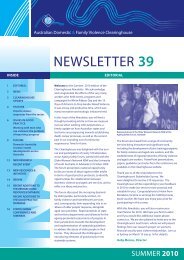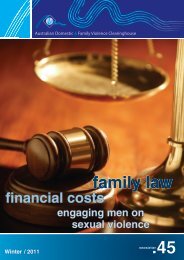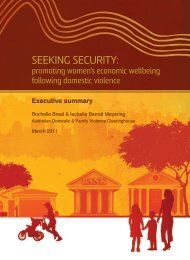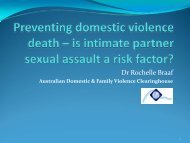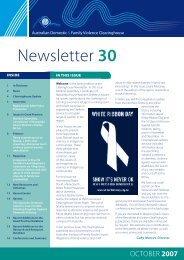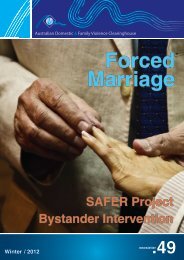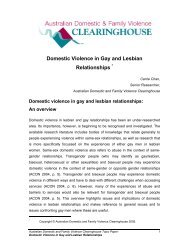Violence through our eyes - Women With Disabilities Australia
Violence through our eyes - Women With Disabilities Australia
Violence through our eyes - Women With Disabilities Australia
You also want an ePaper? Increase the reach of your titles
YUMPU automatically turns print PDFs into web optimized ePapers that Google loves.
MDAA believes that coming from a linguistic and cultural background other than Anglo-<br />
<strong>Australia</strong>n can be a great social barrier and a s<strong>our</strong>ce of discrimination in <strong>Australia</strong>. The<br />
intention of using NESB is not to define people by what they are not but to highlight the<br />
inequity people experience due to linguistic and cultural differences.<br />
3. About the Project<br />
MDAA provides individual advocacy for over 400 people with disability each year. During<br />
the past eight years MDAA has worked with a significant number of women from NESB<br />
with disability and women carers from NESB who have experienced violence. In 2002<br />
MDAA held a forum called “NESB <strong>Women</strong> with Disability and <strong>Violence</strong>”. <strong>Women</strong> were able<br />
to speak up about their experiences of violence, to share their experience with others and<br />
to learn from each other. It was the first time many of the women had been given the<br />
opportunity to speak about their experiences.<br />
Forum participants developed a list of ten most important things that they wanted service<br />
providers to remember when a woman from NESB with disability come to them after<br />
experiencing violence. These were:<br />
1. Listen Actively. Perhaps do home visits.<br />
2. Respect <strong>our</strong> feelings. Be supportive and non-judgmental of <strong>our</strong> feelings.<br />
3. Re-assurance of women’s rights. Explain the processes to us, e.g. what is<br />
counselling, how to organise support for women’s support groups, how these things<br />
can help us.<br />
4. Do not blame us for the violence.<br />
5. Do not discriminate against us.<br />
6. Be honest and well informed about available res<strong>our</strong>ces. Do not make promises.<br />
7. Representation and support in c<strong>our</strong>t. Immediate action, not waiting time (e.g. for<br />
refuges)<br />
8. Be sensitive to <strong>our</strong> culture.<br />
9. Have appropriate training about all forms of violence and disability. Have skills in<br />
problem solving.<br />
10. Have open communication and enc<strong>our</strong>age feedback. Advise service users where to<br />
make complaints.<br />
In July 2003, as a response to the recommendations made by the women, MDAA formed<br />
partnership with Immigrant <strong>Women</strong>’s Speakout Association and the <strong>Violence</strong> Against<br />
<strong>Women</strong> Specialist Unit of the New South Wales Strategy to Reduce <strong>Violence</strong> Against<br />
<strong>Women</strong>, to hold a one day discussion forum entitled ‘Not Just Ramps and Multilingual<br />
Posters’. The Forum provided an opportunity for relevant mainstream and specialist<br />
service providers to discuss the issues raised and to develop strategies to address them.<br />
The forum identified 4 major barriers to service provision for women from NESB with<br />
disability and carers:<br />
1. Difficulty in getting access to women in NESB communities.<br />
2. Training for workers in NESB issues.<br />
3. Cultural ‘taboos’ about acknowledging and discussing domestic violence.<br />
4. Lack of access to services and emergency accommodation for women from NESB<br />
with disability and carers.<br />
<strong>Violence</strong> <strong>through</strong> <strong>our</strong> <strong>eyes</strong> 9


